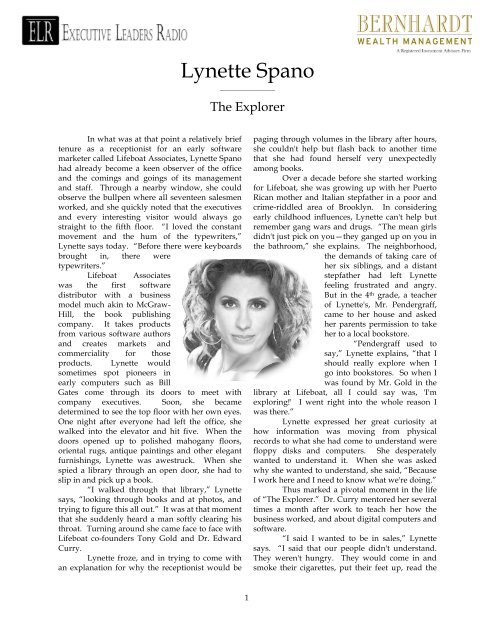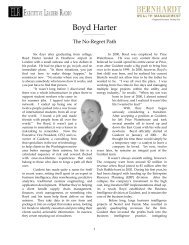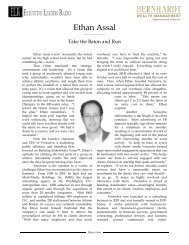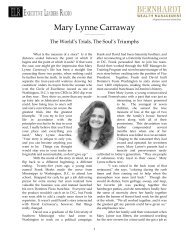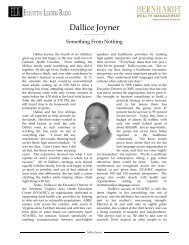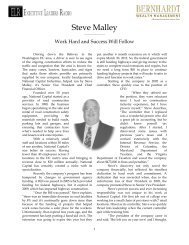Lynette Spano - Executive Leaders Radio
Lynette Spano - Executive Leaders Radio
Lynette Spano - Executive Leaders Radio
You also want an ePaper? Increase the reach of your titles
YUMPU automatically turns print PDFs into web optimized ePapers that Google loves.
<strong>Lynette</strong> <strong>Spano</strong>_________________The ExplorerIn what was at that point a relatively brieftenure as a receptionist for an early softwaremarketer called Lifeboat Associates, <strong>Lynette</strong> <strong>Spano</strong>had already become a keen observer of the officeand the comings and goings of its managementand staff. Through a nearby window, she couldobserve the bullpen where all seventeen salesmenworked, and she quickly noted that the executivesand every interesting visitor would always gostraight to the fifth floor. “I loved the constantmovement and the hum of the typewriters,”<strong>Lynette</strong> says today. “Before there were keyboardsbrought in, there weretypewriters.”Lifeboat Associateswas the first softwaredistributor with a businessmodel much akin to McGraw-Hill, the book publishingcompany. It takes productsfrom various software authorsand creates markets andcommerciality for thoseproducts. <strong>Lynette</strong> wouldsometimes spot pioneers inearly computers such as BillGates come through its doors to meet withcompany executives. Soon, she becamedetermined to see the top floor with her own eyes.One night after everyone had left the office, shewalked into the elevator and hit five. When thedoors opened up to polished mahogany floors,oriental rugs, antique paintings and other elegantfurnishings, <strong>Lynette</strong> was awestruck. When shespied a library through an open door, she had toslip in and pick up a book.“I walked through that library,” <strong>Lynette</strong>says, “looking through books and at photos, andtrying to figure this all out.” It was at that momentthat she suddenly heard a man softly clearing histhroat. Turning around she came face to face withLifeboat co-founders Tony Gold and Dr. EdwardCurry.<strong>Lynette</strong> froze, and in trying to come withan explanation for why the receptionist would bepaging through volumes in the library after hours,she couldn't help but flash back to another timethat she had found herself very unexpectedlyamong books.Over a decade before she started workingfor Lifeboat, she was growing up with her PuertoRican mother and Italian stepfather in a poor andcrime-riddled area of Brooklyn. In consideringearly childhood influences, <strong>Lynette</strong> can't help butremember gang wars and drugs. “The mean girlsdidn't just pick on you—they ganged up on you inthe bathroom,” she explains. The neighborhood,the demands of taking care ofher six siblings, and a distantstepfather had left <strong>Lynette</strong>feeling frustrated and angry.But in the 4 th grade, a teacherof <strong>Lynette</strong>'s, Mr. Pendergraff,came to her house and askedher parents permission to takeher to a local bookstore.“Pendergraff used tosay,” <strong>Lynette</strong> explains, “that Ishould really explore when Igo into bookstores. So when Iwas found by Mr. Gold in thelibrary at Lifeboat, all I could say was, 'I'mexploring!' I went right into the whole reason Iwas there.”<strong>Lynette</strong> expressed her great curiosity athow information was moving from physicalrecords to what she had come to understand werefloppy disks and computers. She desperatelywanted to understand it. When she was askedwhy she wanted to understand, she said, “BecauseI work here and I need to know what we're doing.”Thus marked a pivotal moment in the lifeof “The Explorer.” Dr. Curry mentored her severaltimes a month after work to teach her how thebusiness worked, and about digital computers andsoftware.“I said I wanted to be in sales,” <strong>Lynette</strong>says. “I said that our people didn't understand.They weren't hungry. They would come in andsmoke their cigarettes, put their feet up, read the1
newspapers, then hit the clock at 5pm and leave.They weren't hungry!”Dr. Curry called this a “sense of urgency,”but whatever it was called, <strong>Lynette</strong> had it, and itquickly rocketed her into a position in salessupport. <strong>Lynette</strong> flourished there for two and ahalf years in the face of opposition from some whowere intimidated by her aggressiveness and therapid success she was seeing even without adegree.Toward the end of the two and a halfyears, <strong>Lynette</strong> discovered a sales opportunity withSperry Rand before it would become a part ofUnisys, who was trying to land the largest US AirForce contract of the time. But managers atLifeboat, including Dr. Curry, refused to takeseriously her idea to expand Lifeboat toWashington, DC to handle this possible contract.With that, she left Lifeboat. Sperry Rand securedthe Air Force deal, and <strong>Lynette</strong> started SCIConsulting Services to serve as its consultant, witha twelve-year contract working out of her newoffices in Washington, DC. “In our first year, 1983,we started at $1.7 million in revenue,” <strong>Lynette</strong>says, “and then continued to grow by a millioneach year. Eventually we started to take on moreclients.”Today the result of <strong>Lynette</strong>'s boldness andvision is a 29-year-old company that has evolvedinto a federal integrator of IT services workingwith several government clients, including the USDepartments of Energy and Homeland Security.With 350 employees, their revenues will exceed$50 million this year, and they are poised to be amajor mid-sized player in the federal marketplace.“I love to walk around our facility,” <strong>Lynette</strong> says,“to poke my head into various conference roomsand hear that buzz of activity. People will look upto say good morning, and then they'll just look atme as if to say, 'Do you need something?' It's greatto feel the company have a life of its own thatcarries it forward without my constantinvolvement at every level.”It's not only <strong>Lynette</strong>'s management stylethat keeps her from micromanaging. Several yearsago she experienced a head trauma that wasinitially life threatening and required four years oftherapy. Even though she had to temporarily takea step back from day-to-day operations of SCI, shewas still able to see her company continue to grow.Since then she has worked to channel the energy ofher triumph and survival in the face of both achildhood steeped in a rough, threateningenvironment, and later illness, into efforts to helpothers in need.“When I try to understand how I survivedthat environment as a child,” <strong>Lynette</strong> says, “I thinka lot of it was anger. I had a tough exterior, frommy step-father being tough on me, and I had nofear.” When she saw the chaos of business, shefound that she could thrive in it. “I loved thatchaos because I came from chaos,” <strong>Lynette</strong> says.It was in the climate of gang culture and atough neighborhood that <strong>Lynette</strong> first expressedher entrepreneurial spirit, when she gatheredfriends to work for her shining shoes at certainstreet corners. One day she came home fromschool at 3 o'clock in the afternoon to find a heroinaddict on the staircase to her house. “That was acatalyst,” <strong>Lynette</strong> says. “These things said, 'Youhave to be all you can be and escape this.' Youhave to maneuver yourself around theseminefields, avoid the traps that force you to stayhere and live on welfare in the ghettos and ondrugs.'”Some of her friends never made it out.One got 25 years in prison for cocaine trafficking.Another was shot and killed. One more died froma heroin overdose. “It was Pendergraff whoexposed me early on to those bookstores,” <strong>Lynette</strong>says, “where I had discovered the world thatexisted outside of the ghetto.” Pendergraff gaveher an “injection of influence” that told her therewas more out there. By high school she was alone,but she was made tough by those lessons. By thetime she graduated, it was clear she was not goingto college. She got the receptionist job at LifeboatAssociates, and the rest is history.As a result of her triumph over adversity,<strong>Lynette</strong> has become determined to improve thelives of people who have struggled as she has. Sheis involved with nonprofit organizations that fosterthe development of underprivileged children, andshe has launched an organization called Stars,Stripes, & Hearts in support of Latino Hispanicveterans. In her latest venture, she is expandinginto the entertainment industry to raise money fornonprofits. She has produced an album of herown work, made up of 12 tracks, released underthe name of her mother, who died of cancer. “Mylegacy is about never giving up on someone,”<strong>Lynette</strong> says. “Life is about truly having a love forliving in every aspect. SCI as an institution isgrowing, and it will live on without me.”<strong>Lynette</strong> has a 21-year-old daughter, andshe has tried to impart her wisdom upon her2


